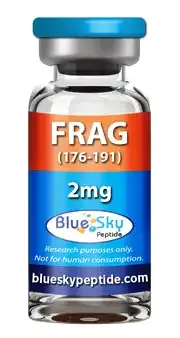45% Off Everything*
Save Now!!

Availability: In stock

| Unit Size | 2 mg/vial |
| Unit Quantity | 1 vial |
| Purity (Mass Spectrometry and UV) | 97.6% |
| Sequence | H-Tyr-Leu-Arg-Ile-Val-Gln-Cys-Arg-Ser-Val-Glu-Gly-Ser-Cys-Gly-Phe-OH |
| Molecular Formula | C78H123N23O23S2 |
| Appearance | Lyophilized White Powder |
| Source | Chemical Synthesis |
| Storage |
Lyophilized FRAGMENT 176-191 is Stable at room Temperature for 90 days, however it is best to storer in a freeze below - 8c for any extended period of time. After reconstitution FRAGMENT 176-191 should be refrigerated at temperatures not to exceed 35 F. |
| Terms | The products we offer are intended for laboratory research use only. Please familiarize yourself with our terms of service prior to ordering. |
Fragment 176-191 (2mg) is a peptide hormone that is derived from the growth hormone-releasing hormone (GHRH). It is a shortened version of the growth hormone molecule, containing only the 176-191 amino acid sequence. Studies have shown that it has the same anti-lipogenic effects as intact human growth hormone, but it does not have a significant lipolytic effect. This suggests that the C-terminal region of the growth hormone is responsible for its anti-lipogenic activity and that its primary effect on lipid metabolism is at the level of lipogenesis.1
Along the same line, another study looked into the effect of fragment 176-191 on obesity in mice. The results of the study showed that the administration of fragment 177-191 reduced cumulative body weight gain and decreased adipose tissue mass in mice. Additionally, the peptide was found to significantly inhibit lipogenesis in adipose tissues. These findings suggest that fragment 177-191 is the functional domain of human growth hormone (hGH), responsible for its anti-lipogenic actions both in vivo and in vitro. Based on these results, the study suggests that fragment 177-191 has the potential to be an effective compound for treating obesity.2
A recent study used fragment 176-191 of hGH to develop innovative drug delivery methods that specifically target cancer cells and improve the effectiveness of chemotherapy.3 The researchers assessed the anticancer properties of chitosan nanoparticles that were loaded with both hGH fragment 176-191 peptide and the chemotherapy drug doxorubicin, compared to chitosan nanoparticles that only contained doxorubicin. To determine the impact of hGH fragment 176-191 peptide on doxorubicin's anticancer capabilities, the researchers conducted in silico experiments, which involved computer modeling and simulations.
The outcomes of the study indicate that the inclusion of hGH fragment 176-191 peptide in doxorubicin-loaded chitosan nanoparticles enhances doxorubicin's binding to various breast cancer protein targets. Furthermore, the dual-loaded chitosan nanoparticles exhibit greater anti-proliferative activity against a breast cancer cell line (MCF-7) when compared to chitosan nanoparticles containing only doxorubicin. This dual-loading approach may potentially enhance the anticancer potency of doxorubicin while minimizing clinical side effects related to exposure of non-target tissues.
Furthermore, researchers tested the effects of different fragments of human growth hormone on blood glucose levels in rats. They found that fragment 176-191, along with the other three fragments, caused a short-term increase in blood glucose and a longer-lasting increase in plasma insulin.4
Overall, the animal and in vitro studies suggest that fragment 176-191 has promising potential as a therapeutic agent for weight loss, fat reduction, and immune system enhancement. However, further studies are needed to evaluate the safety and efficacy of the peptide.
References: 1. Wu Z, Ng FM. Antilipogenic action of synthetic C-terminal sequence 177-191 of human growth hormone. Biochem Mol Biol Int. 1993 May;30(1):187-96. 2. Natera SH, Jiang WJ, Ng FM. Reduction of cumulative body weight gain and adipose tissue mass in obese mice: response to chronic treatment with synthetic hGH 177-191 peptide. Biochem Mol Biol Int. 1994 Aug;33(5):1011-21. 3. Ng FM, Bornstein J. Hyperglycemic action of synthetic C-terminal fragments of human growth hormone. Am J Physiol. 1978 May;234(5):E521-6. 4. Habibullah MM et al. Human Growth Hormone Fragment 176-191 Peptide Enhances the Toxicity of Doxorubicin-Loaded Chitosan Nanoparticles Against MCF-7 Breast Cancer Cells. Drug Des Devel Ther. 2022 Jun 27;16:1963-74.